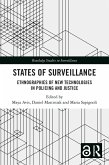Dieser Download kann aus rechtlichen Gründen nur mit Rechnungsadresse in A, B, BG, CY, CZ, D, DK, EW, E, FIN, F, GR, HR, H, IRL, I, LT, L, LR, M, NL, PL, P, R, S, SLO, SK ausgeliefert werden.
Timothy Caulfield, Canada Research Chair in Health Law and Policy, Professor in the Faculty of Law and the School of Public Health, and Research Director of the Health Law Institute, University of Alberta, Canada
"This excellent book, written by one of the leading researchers in the field, is a must read for anyone with an interest in how the online emotion economy works. It offers a highly compelling analysis of the complex relationship between emotions and the media, highlighting the vested interests that drive the digital ecosystem. It draws on a range of fascinating examples including the digital wellness industry and the emotional labour exploited online through social media influencers."
Alison Anderson, Professor in Sociology, University of Plymouth, UK
"This much needed volume reviews how our online lives have irrevocably changed during the course of the twenty first century. Our emotions provide the vital link between our embodied inner selves and the wider society, and their powerful manipulation through social media can be polarised between the extremes of good or evil. This incisive critique views those emotional processes and implications through a sociological lens to reveal the potential for the advancement of the social benefits of digital technology on the one hand, to the dangerous and destructive consequences of the other."
Gillian Bendelow. Professor Emerita in Sociology of Health and Medicine, University of Brighton, UK
"Alan Petersen's Emotions Online is an invaluable exploration and appraisal of the entanglement of contemporary emotional life with digital media and their affective regimes, employed to attract and monetise attention. Analysing the novel forms of online misinformation, addiction and abuse, Petersen provides us with a powerful sociological approach to consider how emotional wellbeing in contemporary societies requires profound changes in the design and operation of digital media."
Benjamin Marent, Assistant Professor in Digital Technologies at Work, University of Sussex, UK









